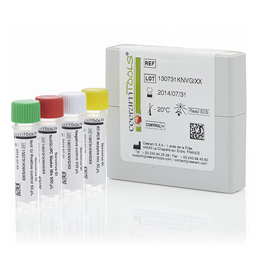Hepatitis Viruses PCR detection kits
Real-time RT-PCR detection kits- All types of food samples
- ISO/TS 15216-1&2 compliant
- Process control & quantification kits
Hepatitis A Virus Detection
The Hepatitis A Virus Detection Kit KHAV allows the detection of hepatitis A virus by real-time RT-PCR, in all types of environmental (water, wastewater, seawater, sludge, air, surface, etc.) and food (shellfish, fruits, vegetables, processed food, etc.) samples. 48 real-time RT-PCR reactions can be performed with each kit. In compliance with ISO/TS15216-1&2 Standard.
- Utilizes molecular technologies for validated detection of Hepatitis A virus
- Allows for detection down to 5 hepatitis A copies per reaction
- Assemble RT-PCR reactions with included master mix, enzyme mix, internal positive control, and negative control
Hepatitis A Virus and Transmission
Hepatitis A virus is a non-enveloped single strand RNA virus. The delay of incubation is around one month. Transmission via the fecal-oral route is the most common. Food samples can be contaminated via food handlers or by the environment. Due to their structural properties, Hepatitis A virus can be resistant to different physical/chemical treatments and food processes. Adsorbed on particles, they can survive in different kinds of environments for long periods of time. The consumption of contaminated food can lead to human outbreaks. There is no specific curative treatment but a vaccine is available.
Molecular Detection of Hepatitis A
Serological methods have not been effectively adapted for hepatitis E virus detection in environmental or food samples. Detection by cell culture is difficult. Detection by real time RT-PCR, after extraction and purification of the viral RNA, is a method of choice taking into account its speed and its sensitivity
Hepatitis E Virus
The Hepatitis E Virus Detection KHEV enables the detection of hepatitis E virus by real-time RT-PCR, in all types of food samples (e.g., shellfish, fruits, vegetables, processed food, etc.). 48 real-time RT-PCR reactions can be performed with each kit.
- Utilizes molecular technologies for validated detection of hepatitis E virus
- Detects as few as 5 genome copies of hepatitis E Virus per reaction
- Assemble RT-PCR reactions with included master mix, enzyme mix, internal positive control, and negative control
Hepatitis E Virus and Transmission
Hepatitis E virus is a non-enveloped, single-strand RNA virus with four gentoypes (1, 2, 3, 4). Feco-oral transmission is the most common route of transmission of this virus. Food samples are typically contaminated with hepatitis E virus by food handlers or the environment. Due to its structural properties, hepatitis E virus is resistant to many physical/chemical treatments and food preparation processes, contributing to its long-term survival in many different environments. The subsequent consumption of contaminated food can then lead to human outbreaks.
Molecular Detection of Hepatitis E Virus
Serological methods have not been effectively adapted for hepatitis E virus detection in environmental or food samples. Detection by cell culture is difficult. Due to their speed and sensitivity, molecular techniques (e.g., real time RT-PCR) are the methods of choice for hepatitis E virus detection after extraction and viral RNA purification.

